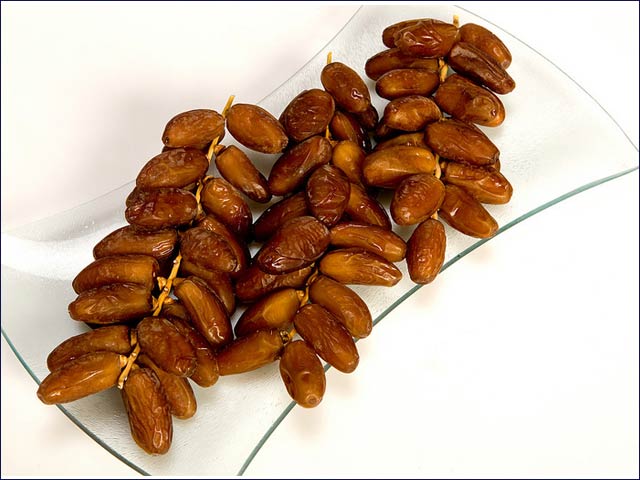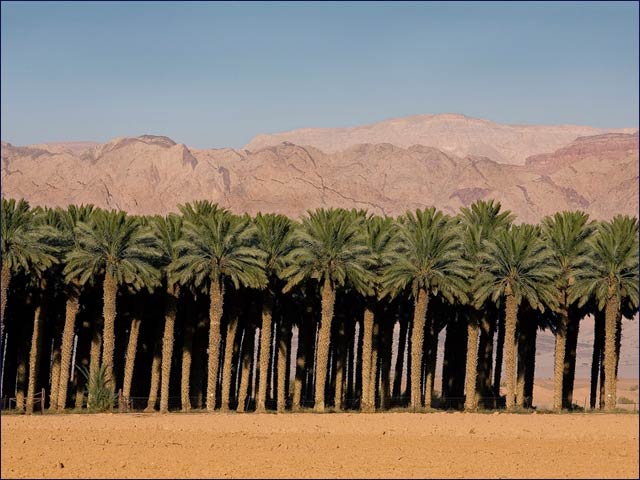By Avigayil Kadesh
The Bible includes dates among the seven species of the Land of Israel, along with wheat, barley, grapes, figs, pomegranates and olives. But just as the vineyards of the Holy Land had to be painstakingly replanted before modern Israel could once again start producing world-class wines, date palms also had to be brought back to the 20th century.
Some were smuggled in during the 1930s by Kibbutz Kinneret founder Ben-Zion Yisraeli from Egypt, Iraq, Kurdistan and Persia. Forty years later, the coveted Medjoul and Deglet Nour varieties arrived from California via the Jewish Agency.
Today, the Hadiklaim Israeli Date Growers Cooperative exports $65 million worth of dates every year. Nine varieties of its King Solomon and Jordan River brand dates are sold in 25 countries on five continents through major retailers including Marks & Spencer (UK) and Kroger’s (US).
The most popular variety is Medjoul, according to Chezi Almog, VP-marketing for the cooperative. Jordan Valley-grown Medjoul dried dates account for 35 percent of the global Medjoul market. They’re plump, soft and fleshy, weighing 20 to 30 grams as compared to typical dates that weigh six to 11 grams.
And that’s what customers are seeking.
Whereas dried dates used to be considered a snack food or an ingredient for Christmas fruitcakes, people are discovering their versatility and nutrition profile. They are no longer content with glucose-coated, preserved fruit packed in a boring cardboard box.
“The new trend is ‘fresh and natural.’ The product is now moving firmly to year-round and fresh -- that’s what people are looking for,” says Almog. “Softer and sweeter is in demand, and we make them soft by harvesting a bit earlier. The dates start full of water and as they mature, more sugar develops inside.”
Putting these bigger, softer and sweeter dates in see-through packaging, and nesting premium dates in individual paper cups like chocolates, allows the product to be displayed in the market alongside strawberries and cherries.
Good and good for you
This year, the overall date harvest in Israel is expected to add up to 20,000 tons and $80 million of market value, led by the Medjoul and followed by Barhi, Deglet Nour and Hayany. Twenty years ago, Israel was exporting only 1,500 tons of dates worth $4 million.
“Our growth in America is huge,” says Almog. “This year we’ll be exporting 800 tons (to the US), while five years ago it was only 60 to 70 tons.”
Part of the reason for dates’ popularity is public awareness of their health benefits.
 Israeli dates are found on more and more tables worldwide.
Israeli dates are found on more and more tables worldwide.Photo courtesy of Hadiklaim Israeli Date Growers Cooperative
Dates stabilize blood pressure and contain healing antioxidants, vitamins A and B, protein and dietary fiber. They have been shown to protect against heart attack and stroke by lowering blood triglyceride levels. And because some 60% of a dried date is natural sugar (as opposed to 30% in a fresh date), they provide quick energy and do not need preservatives.
“Except for organic, all other dried fruits are preserved with potassium sorbate or SO2 [sulfur dioxide],” says Almog. “Otherwise it will discolor or ferment. We are not allowed to use any preservatives on our dates. They are washed with plain water and that’s it. The sugar preserves them.”
And instead of fumigating the date shipments to kill insects, Israeli dates are heat-treated using a method developed at the Volcani Institute, the Ministry of Agriculture’s research organization. “We spend a lot to bring you the dates in the same condition they were in at harvest,” says Almog.
Growing along the rift
All Israeli dates are grown in the Jordan Valley and Arava. This region offers the perfect hot climate for dates to mature properly.

Date palms were reintroduced to Israel in the last century.
Photo courtesy of Hadiklaim Israeli Date Growers Cooperative
Hadiklaim has 15 packing stations situated near member plantations, some of which operate seasonally and others year-round.
“Last year and this year,” says Almog, “we have also been exporting Palestinian farmers’ dates from Jericho, shipping them to Dubai and Europe in a box that says ‘Produce from Palestine.’ We have a lot of Palestinian workers in our fields and packing houses because we pay more. There is a good relationship between people, and it’s alive, no matter where the borders are.”
Dates are, in fact, central to Arab food culture. During the month of Ramadan, Muslims break their daily fast on dates and water, but the fruit is popular all year. Residents of Arab countries consume 10 times more dates annually, on average, than do Israelis.
The Medjoul, the king of dates, was “born” in Morocco, Almog relates. However, disease killed off Moroccan date palms 40 or 50 years ago, and the only ones that survived were moved to California. It was there that the Jewish Agency bought some to transplant in the Arava Valley in the 1970s. This variety soon overtook the others for popularity.
“Immediately, you can see it’s big and the appearance is eye-catching,” says Almog. “People buy according to appearance.”